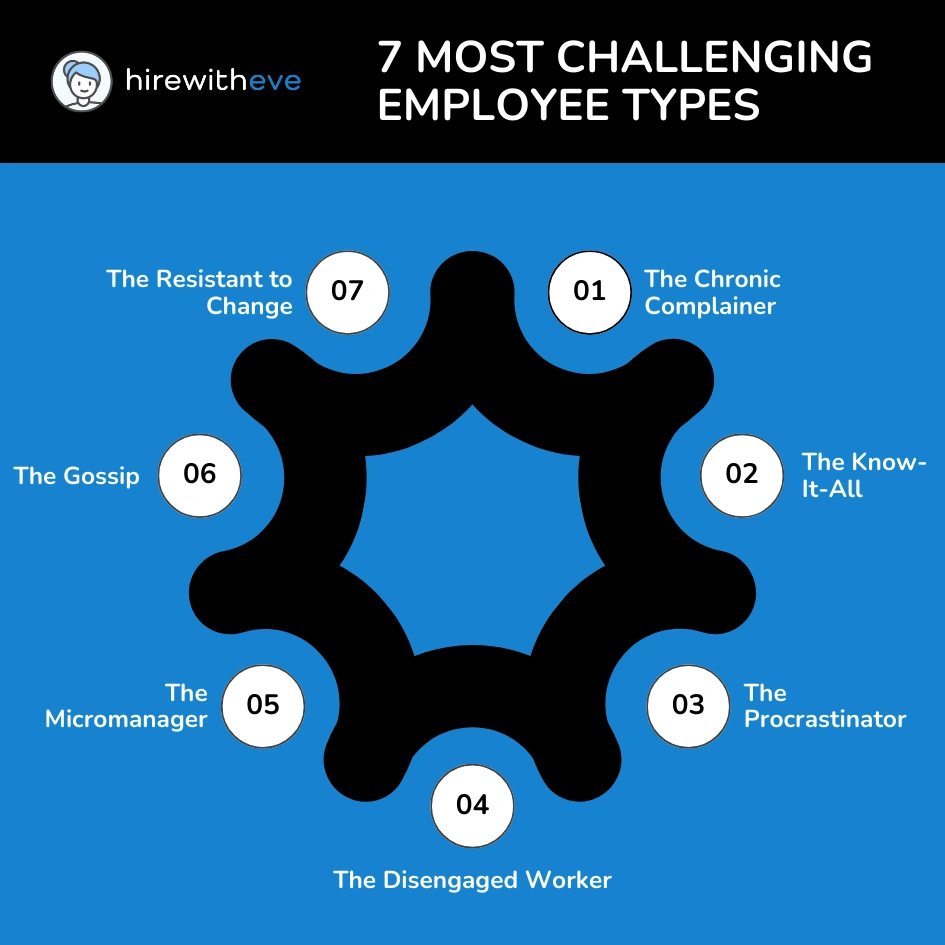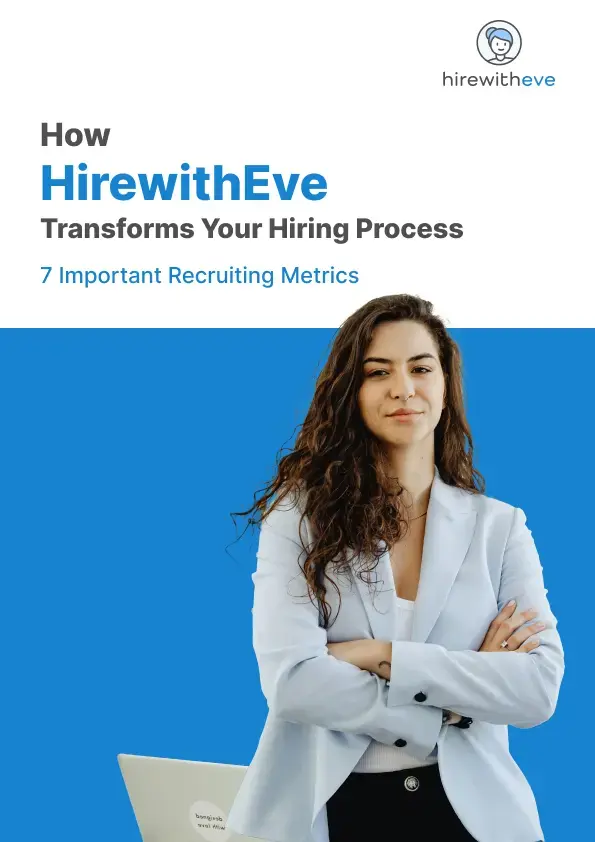7 Most Challenging Employee Types and How to Deal with Them
7 Most Challenging Employee Types and How to Deal with Them

Did you ever feel like you’re managing a circus instead of a team?
In the workplace, diverse personalities can sometimes lead to challenges that disrupt harmony and productivity. Every team has its unique blend of individuals, but certain employee types can present significant hurdles for managers and colleagues alike. From the chronic complainer to the disengaged worker, navigating these dynamics requires skill and understanding.
In this blog, we’ll explore seven of the most challenging employee types and offer practical strategies to effectively manage and support them, promoting a more cohesive and productive workplace for everyone.
Table of contents
What Are the 7 Most Challenging Employee Types?
Here are seven of the most challenging employee types that HR has to deal with:

The Chronic Complainer
This employee consistently expresses dissatisfaction with various aspects of their work environment, including management decisions, team dynamics, or workload. Their ongoing negativity can create a toxic atmosphere and impact team morale.
The Know-It-All
This type of employee believes they possess the best solutions for every problem and often dismisses the ideas of others. Their overconfidence can hinder collaboration and discourage innovative thinking among team members.
The Procrastinator
This employee frequently delays tasks and struggles to meet deadlines, which can disrupt project timelines. Their tendency to put things off can create stress for colleagues who depend on their contributions.
The Disengaged Worker
This employee shows little interest or motivation in their work, often completing tasks without enthusiasm or commitment. Their lack of engagement can negatively affect team morale and overall productivity.
The Micromanager
This type of employee feels the need to control every detail of their work or the work of others. Their behavior can stifle creativity and independence, leading to frustration among team members who feel they are not trusted to perform their roles.
The Gossip
This employee frequently engages in office gossip and spreads rumors, which can create a toxic work environment. Their behavior undermines trust and cohesion within the team, leading to interpersonal conflicts.
The Resistant to Change
This employee struggles to adapt to new processes, technologies, or organizational changes. Their resistance can slow down progress and make it challenging for teams to implement necessary adjustments in a dynamic work environment.
Strategies to Deal with These Challenging Employee Types
Here are strategies to effectively deal with the seven challenging employee types:
The Chronic Complainer
Listen Actively: Provide a space for them to express their concerns without interruption. Sometimes, they just need to feel heard.
Encourage Solutions: Instead of just dwelling on the negative, prompt them to think of potential solutions to their complaints.
Set Boundaries: If their complaints become excessive, establish guidelines for when and how often they can bring up issues.
The Know-It-All
Encourage Collaboration: Foster an environment where teamwork and collaboration are emphasized, allowing everyone’s ideas to be valued.
Provide Constructive Feedback: Address their behavior and emphasize the importance of considering others’ perspectives in problem-solving.
Set Clear Expectations: Define roles and responsibilities to minimize overlap and clarify that every team member’s input is crucial.
The Procrastinator
Set Clear Deadlines: Establish clear deadlines and break larger projects into manageable tasks with specific timelines.
Check-In Regularly: Schedule regular follow-ups to monitor progress and provide accountability.
Identify Obstacles: Work together to uncover any barriers affecting their productivity and discuss potential solutions.
The Disengaged Worker
Conduct One-on-One Meetings: Have conversations about their interests and career goals to understand what might be affecting their engagement.
Provide Growth Opportunities: Offer training and professional development to reignite their passion for their work.
Foster Inclusion: Involve them in team discussions and decision-making processes to help them feel more connected to the team.
The Micromanager
Encourage Autonomy: Clearly define expectations and encourage them to trust their team members to deliver results independently.
Provide Training: Offer coaching on effective management practices, focusing on the importance of delegation.
Set Clear Goals: Define objectives and key performance indicators (KPIs) to shift their focus from control to outcomes.
The Gossip
Address Behavior Promptly: Speak with them privately about the negative effects of gossip and encourage more positive communication.
Promote a Positive Culture: Foster an environment where open communication is valued and encourage addressing issues directly.
Lead by Example: Demonstrate positive communication behaviors and encourage your team to do the same.
The Resistant to Change
Communicate the Benefits: Clearly explain the rationale behind changes and how they will benefit the team and organization.
Involve Them in the Process: Engage them in discussions about upcoming changes to help them feel included in the process.
Provide Support and Training: Offer resources, training, or mentorship to help them adapt to new processes more comfortably.
Conclusion
Effectively managing challenging employee types is essential for fostering a positive work environment and maintaining team productivity.
By employing the targeted strategies that are mentioned above, leaders can address individual challenges while promoting collaboration and engagement across the team.
This is where HirewithEve can play a crucial role — our hiring assessment platform helps organizations identify candidates who not only possess the necessary skills but also fit well within the company culture. By making informed hiring decisions from the outset, you can minimize the likelihood of encountering these challenging employee types, leading to a more cohesive and high-performing team.
Embrace the power of smart hiring with HirewithEve to build a workforce that thrives together.
Target Your Talent
Unlock tailored solutions for your recruitment and hiring needs with Eve Platform's extensive case study library.
Subscribe now to enhance your HR expertise and excel in your role.
Free Resources

Transforming Hiring: 7 Key Recruiting Metrics
Enhancing recruitment processes with data-driven insights for better hiring outcomes.

Reducing Hiring Bias with Hirewitheve.
Utilizing Hirewitheve to combat bias and streamline recruitment processes effectively.

Hiring Detail-Oriented Candidates
HirewithEve enhances hiring by accurately assessing candidate's attention to detail-oriented.
